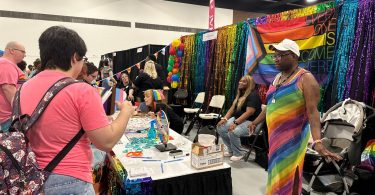June is Pride Month. Even though US President Donald Trump has yet to issue a proclamation for Pride Month, breaking a recent tradition that Lesbian, Gay, Bisexual and Transgender advocacy groups call “deeply disappointing” but not entirely surprising. Trump’s daughter Ivanka, however, tweeted her solidarity with the LGBTQ community instead.
Regardless every major city in the United States and in many countries in the world have GAY PRIDE events scheduled for this month. It will be a month of acceptance, LGBT tourism and party for the LGBT Community and their friends.
It’s getting easier for LGBTQ travelers to discover the world. Gay-friendly countries and cities are plentiful around the world, and marriage equality is becoming common in Western Europe and the Americas. But with so many options, where should you go? Jeff Guaracino and El Salvato have the answer. Their book, The Handbook of LGBT Tourism and Hospitality
How is LGBTQ tourism doing these days?
LGBTQ tourism is doing very well right now, but reliable estimates of global spend by LGBTQ travelers are difficult to come by. Often times you hear that LGBTQ travelers in the United States spend about $65 billion per year, but this isn’t backed up by solid research.
As someone who’s chronicled and, in part, helped shape LGBTQ travel since 1998, I can see many changes. More and more major brands are targeting the LGBTQ travel segment than ever before. LGBTQ travelers have more options.
Many years ago, gay travelers would have to choose from a few spots like Mykonos, Provincetown, Key West, Sitges or Palm Springs. These were among the few places where a gay or lesbian person could be with a same-sex partner without worrying that they would attract unfriendly attention, or worse, harassment and violence. Today, gays are far more widely welcomed. Thank goodness, times are changing!
Why are LGBTQ travelers so appealing to marketers?
LGBTQ travelers, especially gay men, have many characteristics that marketers like: They usually are in a relationship with another man, so the couple together has more disposable time and income than many other couples. Research shows they spend more money when on vacation, and take more vacations than their heterosexual counterparts. I love my nephews and nieces, but it’s nice not having children!
Gay travelers are more likely to own a passport. They also reward those who market to them with their business. They’re loyal customers. They can also travel during shoulder season (the period between peak and off-peak travel seasons) and other periods when children are home and people with families can’t travel. They are also less likely to stop vacation spending when the economy goes into recession — or after episodes of terrorism.
You refer to LGBTQs, but in ads one usually just sees gay travelers, and occasionally lesbian travelers. What about the B, T and Q?
We use the phrase “LGBTQ traveler” to be inclusive, but when it comes to actually marketing to people — in other words, getting “heads in beds” or “butts in seats” — many companies and brands target gay men since they are the most lucrative. Gay men are also easier to target with marketing. Women are harder. Women tend to travel as women first, not lesbians. For men, being gay is usually the first consideration when they travel.
No one markets to bisexual travelers — when they’re with a same-sex partner, you can market to them with gay marketing techniques. Very few target the transgender traveler; it’s a new demographic and there’s not much research yet. Unfortunately, trans travelers are at a disadvantage: Demographically, they make less money and travel less. There’s also the difficulty of traveling with outdated identification. If their passport uses their dead name and previous photograph, it can cause problems while traveling.
Male-only, all-gay guesthouses are losing ground. Do gay travelers now prefer integration?
I think that younger male travelers no longer feel the need to go to an all-male environment, since they feel safe in a mixed environment. Still, some younger travelers do enjoy all-male guesthouses since they’re more fun!
When all-gay guesthouses do really smart marketing, they keep their occupancy high year-round. Good examples of this are Island House Key West, Frog Meadow in Vermont and a small handful of others. I don’t think there are any all-lesbian guesthouses left, though I am not 100% sure.
Why would you say Asia is the world’s most gay-friendly destination when some Asian countries are rather homophobic?
There are over 73 countries where homosexuality is criminalized, and many of those are in the Caribbean, Africa and Asia. Usually in Asian countries they are socially homophobic, meaning that marriage (and raising children) is the most important aspect of their culture. For visitors, they really don’t care as long as the visitor (male, female, gay or straight) doesn’t flaunt their sexuality. Thailand is very gay-friendly. Taiwan may legalize same-sex marriage. Even China — which is very traditional — has gay bars and a vibrant gay community.
How about Europe, France in particular?
France and Western Europe have a liberated view of sexuality. They don’t care what anyone does behind closed doors. However, they don’t have the same notion we do in the United States where people want to be recognized and celebrated for their uniqueness — including sexuality. In France and many other parts of Western Europe, people think everyone should be treated equally.
But for those businesses in Western Europe that want to target gay travelers from North America, it’s important to note that gay people want to be accepted as gay and treated like everyone else. It’s a subtle difference. The smartest European tourism marketers hire an expert from the United States when marketing to North American gays.
Does LGBTQ tourism follow the advancement of LGBTQ rights, or can LGBTQ tourism make a country more accepting?
As soon as gays have more rights in a country — most notably marriage equality — marketers are right there targeting the lucrative gay marriage and honeymoon market. We saw this time and time again in Canada and the United States. That said, I believe that being our authentic selves while abroad — especially to countries that aren’t as familiar with out gay people — is the best way to open minds and build bridges.






